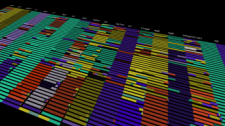Taking Genomic Data Global
By Elizabeth Woyke,
MIT Technology Review
| 07. 25. 2016
Colon cancer is less common in India than in the U.S., but it tends to affect younger people and to be more aggressive when it does occur. Indians with colon cancer also have different genetic mutations from the ones affecting patients who have been studied in Western countries, and whose information is the basis of most published data on the disease. A vegetarian diet may help explain the overall statistics, but why do some Indians develop a more serious form of the disease at a younger age?
Doctors suspect that differences in the genome may help explain how colon cancer expresses itself in the two groups. A startup called Global Gene Corp plans to study Indian patients’ genomes to find out what those links may be and whether they yield clues to better treatment.
The company will analyze patients’ DNA as well as the genomics of their cancer cells, using algorithms to identify treatment options for individuals—as well as broader trends. Aggregate data could be relevant for pharmaceutical companies looking to develop new medicines, and for policy makers, too....
Related Articles
By Josie Ensor, The Times | 12.09.2025
A fertility start-up that promises to screen embryos to give would-be parents their “best baby” has come under fire for a “misuse of science”.
Nucleus Genomics describes its mission as “IVF for genetic optimisation”, offering advanced embryo testing that allows...
By Hannah Devlin, The Guardian | 12.06.2025
Couples undergoing IVF in the UK are exploiting an apparent legal loophole to rank their embryos based on genetic predictions of IQ, height and health, the Guardian has learned.
The controversial screening technique, which scores embryos based on their DNA...
By Frankie Fattorini, Pharmaceutical Technology | 12.02.2025
Próspera, a charter city on Roatán island in Honduras, hosts two biotechs working to combat ageing through gene therapy, as the organisation behind the city advertises its “flexible” regulatory jurisdiction to attract more developers.
In 2021, Minicircle set up a...
By Vardit Ravitsky, The Hastings Center | 12.04.2025
Embryo testing is advancing fast—but how far is too far? How and where do we draw the line between preventing disease and selecting for “desirable” traits? What are the ethical implications for parents, children, clinicians, and society at large? These...




